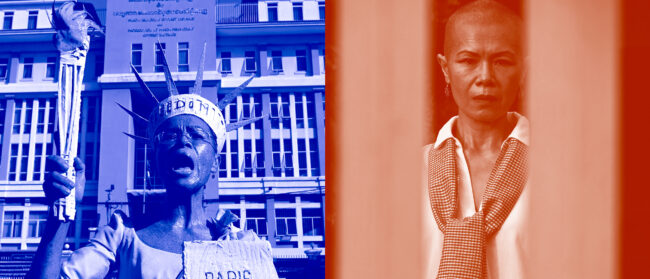A recent announcement that the Myanmar military would execute members of the resistance is intended as a show of strength.
For most of the population, the restoration of capital punishment is further evidence that the military is a uniquely immoral institution that must be overthrown at all costs. For the international community, it must be the impetus to act.
Junta spokesperson Zaw Min Tun said in June that death penalties would be implemented for four members of the opposition. Deposed National League for Democracy (NLD) MP Phyo Zeya Thaw and prominent democracy activist Kyaw Min Yu, better known as Ko Jimmy, were convicted of helping organised armed resistance in Yangon, Myanmar’s largest city. Hla Myo Aung and Aung Thura Zaw were found guilty of killing an alleged informant in western Yangon a few months after the February 2021 coup that brought the junta to power.
Condemnation of the announcement was extensive and swift. The United Nations described the death sentences as a “vile attempt at instilling fear” among the Myanmar people, foreign embassies including those of the United States and France condemned the move and the parallel National Unity Government (NUG) described “lawless” use of the death penalty as a “grave crime”.
Even Cambodian Prime Minister Hun Sen, a routine violator of human rights, criticised the decision, urging coup leader Min Aung Hlaing to “reconsider” the death sentences and refrain from using the death penalty.
The Tatmadaw, as the army is known, responded by describing the criticisms as “irresponsible and reckless,” adding that the men were convicted according to an independent judiciary. It is anything but.
The military’s intention to execute members of the resistance should be taken for what it is – the clearest indication yet that there is no line it won’t cross to hold onto power.

The plan to enforce the death penalty is an attempted demonstration of strength towards the Myanmar people, the vast majority of whom since the coup have openly expressed anger towards the generals for destroying their hopes for the country’s future.
In the military’s warped worldview, the population is not there to be protected, but should instead submit to the army’s whims, and be thankful for the unique role it claims to have played in keeping the country intact since gaining independence in 1948.
This message is communicated through violent and thuggish means. Gunning down thousands of peaceful protesters is supposed to demonstrate this power, as is ransacking and torching entire villages, looting and killing livestock in rural areas and routine airstrikes on villages swarming with civilians. Sentencing high-profile activists to death is supposed to be another demonstration of the military’s might.
In the military’s warped worldview, the population is not there to be protected
But widespread violence has not been an effective approach in quelling dissent, and instead has worked against the military. Each display of force has been met with even firmer resistance by the Myanmar people, who are well and truly through the looking glass when it comes to recognising the Tatmadaw as a violent force intent on holding onto power by all means necessary.
This resistance was first seen shortly after the coup in the form of peaceful protests across the country, and has evolved into much more. The opposition has formed a parallel government gaining increased international recognition, while grassroots organisations are providing administrative support, education and healthcare where the military is too busy killing to effectively govern.
Public resistance has also inspired an armed uprising in almost all corners of the country, resulting in devastating losses to junta troops, as the opposition supply lines and combat methods look set to improve.
The planned executions will only strengthen the resolve of the Myanmar people and could likely speed up the military’s own demise.
More than 100 people have been sentenced to death by the junta, and failure to halt the initial four executions could result in more taking place, leading to a spiral of distrust and violence making the current situation worse.
The international community must now step up and help the Myanmar people in their clear mission to remove the military from power, moving towards a country that is inclusive, fair and free from tyranny.
Foreign governments are right to condemn the planned executions in the strongest possible terms and must use all means at their disposal to prevent them from taking place. This includes ASEAN member states who have a direct line to the generals, which they must use to convince them that executing these men does not work in the military’s best interests.
Publicising the execution plans should be a clear message to the international community that the military will stop at nothing to retain power, and reinforce the need for outside actors to support efforts by the Myanmar people to overthrow the regime.
This support includes addressing the military’s culture of impunity, a root cause of the coup. The world failed to effectively respond to the Tatmadaw’s devastating violence against Myanmar’s ethnic Rohingya community in 2016 and 2017, but there is an opportunity to correct that.
Other nations must lend financial and administrative support to The Gambia’s case against Myanmar at the International Court of Justice, push the UN Security Council to refer the situation to the International Criminal Court and pursue their own cases under the principle of universal jurisdiction, including in Southeast Asia.
Pressure must also effectively target all of the military’s business interests. Some countries have taken steps to sanction military figures and conglomerates since the coup, but until now these efforts have been largely piecemeal. A concerted and unified international effort is required to identify all forms of revenue for the junta, and every effort made to cut off its access.
After more than a year of inaction by the international community to halt the junta’s violence and force it into any sort of compromise, its explicit announcement that it will formally execute members of the resistance should be the clearest signal yet that there is no line it won’t cross to hold onto power, and that a unified effort is required by outside actors to help the Myanmar people in their clear desire to remove the military from power.
Oliver Slow is a journalist and author of the forthcoming book, Return of the Junta: Why Myanmar’s military must go back to the barracks.


